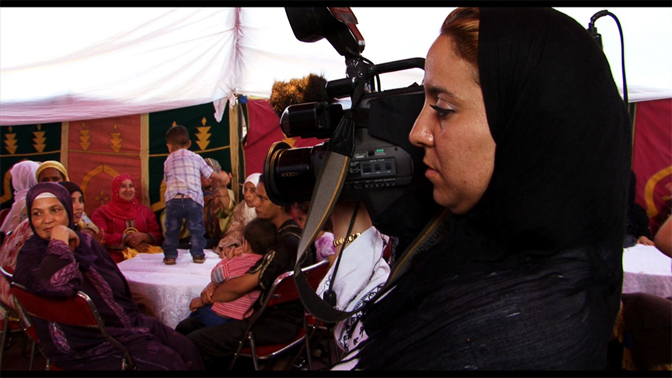Still from "Camera/Woman," courtesy of Women Make Movies.
Camera/Woman
Directed by Karima Zoubir
WMM, 2012
“Camera/Woman” is a poignant documentary set in Casablanca that touches upon the complex issue of gender in Moroccan society and focuses on a few key issues such as the lives of divorced women, the taboo of women working in certain professions, and the difficulties associated with challenging the established status quo.
Directed by Karima Zoubir, an International Documentary Festival Amsterdam (IDFA) WorldView winner, the film follows Khadeja, a divorcée with an 11-year-old son to support, who moves back to her family’s house following her marital separation. Khadeja procures gainful employment as a camerawoman at weddings and other special occasions in Casablanca, even though her family considers it a disgrace and vehemently objects.
One of the opening scenes epitomizes Moroccan society’s angst about women working. Khadeja, after filming a wedding late at night, attempts to find a taxi in the eerily empty streets. The camera films her as she climbs into the car and is accosted by the driver who, without invitation, immediately asks her what she was doing out so late, and whether her husband opposes her profession.
Khadeja’s resilience and determination to carve out a life for herself is constantly undermined by her family’s discouragement that is further fueled by the neighborhood’s disapproving gossip. Touching on the hypocrisy of the society, her entire family criticizes her profession, despite the fact that she is the primary breadwinner. They even attempt to force her into another marriage in order to quell the neighbor’s gossip.
Paradoxically, the rise of the conservative belief that non-familial men should not participate in special engagements directly leads to Khadeja’s work and the rise of women working at social engagements. Women now shoot videos, take photographs, and play music, although these roles have never been held by women before.
The opulence and magic of the celebrations Khadeja films is juxtaposed with the reality the women featured in the film experience. The film enters the realm of fantasy by showcasing Moroccan celebratory culture in contrast to the realities of life, and especially life as a divorced woman. The film challenges societal depictions of divorced women as “useless”, “unacceptable” or in more stark language “prostitutes.”
Zoubir’s exploratory documentary pays homage to the strength of Moroccan women who are forging a space for themselves in their society, despite everyone’s condemnation. Khadeja’s defiance to survive in a society that would prefer her silent is a testament to the struggle of women across the region.
This article appeared in Al Jadid Magazine, Vol. 17, No. 65, 2011.
Copyright © 2013 AL JADID MAGAZINE

